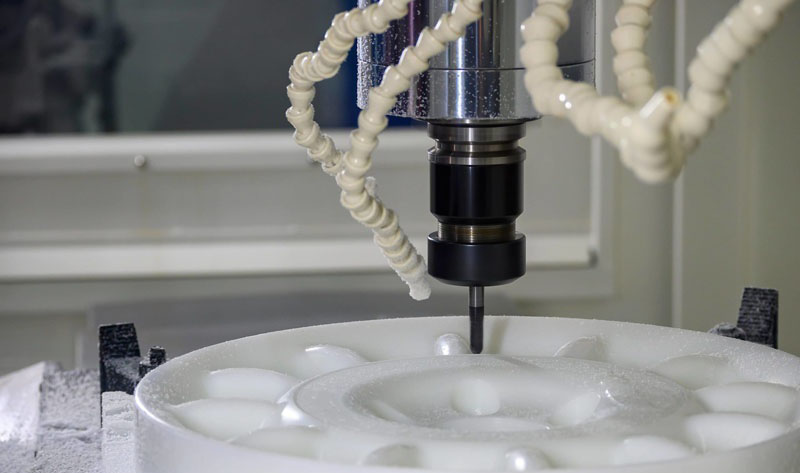Polyoxymethylene homopolymer (POM) is a semi crystalline thermoplastic with impact resistance and wear resistance, which is widely used in various machining applications. It is favored by machinists because of its excellent material properties and high machinability.
Although opaque in nature, POM is available in a variety of colors. Its density is 1.410-1.420 g / cm3, crystallinity is 75-85%, and melting point is 175 ° C.
POM is very suitable for machining, such as milling and lathe. It can also be cut by laser, and its particles can also be used for injection molding and plastic extrusion.
Today, we mainly introduce the characteristics of this material and the advantages of CNC machining process this material.

Electrical characteristics
POM has excellent heat insulation performance, coupled with its excellent mechanical strength, POM is a very suitable material for electronic components.
POM can also withstand a large amount of electrical stress, making it suitable for use as a high-voltage insulator. Its low moisture absorption also makes it an excellent material for keeping electronic components dry.
Mechanical Strength
POM has a tensile strength of 7000-9000 psi, is also very hard, has strong toughness, and has a density less than that of metal. Making it suitable for lightweight parts that need to withstand high pressure.
Fatigue Strength And Wear Resistance
POM is a very durable material with excellent fatigue failure resistance in the temperature range of – 40 ° to 80 ° C. In addition, its fatigue resistance is less affected by water, chemicals or solvents. This characteristic makes it an ideal material for parts that need to withstand repeated impact and stress.
Impact resistance
POM can withstand instantaneous impact without failure, which is mainly due to its very high toughness. POM after special treatment can provide greater impact resistance.
Good dimensional stability
Dimensional stability measures the ability of a material to maintain its normal size after being exposed to pressure, temperature and other conditions during processing. POM will not deform during machining, which is very suitable for cutting and can achieve accurate tolerance.
Friction characteristics
Moving mechanical parts are usually lubricated to reduce friction when they rub against each other. POM machined parts are very slippery and do not need lubrication. This function can be used as part of a machine where the external lubricator may contaminate the product, such as a food processing machine.
Firmness
The high tensile strength and durability of POM make it suitable for high stress applications. POM is very strong and is often used as a substitute for steel and aluminum alloys.
moisture-proof
POM can absorb little water even under the wettest conditions. This means that it can maintain its structural integrity even in underwater applications.
Anti creep
POM is a very tough material, which can withstand a lot of pressure without failure. This excellent durability makes it the preferred material for parts in many industries.
Electrical insulation
POM is an excellent insulator. Because of this characteristic, it is used in many electronic products.
In addition to the above advantages, POM has some disadvantages.
Low adhesion
Due to its chemical resistance, POM does not react well to adhesives, resulting in difficulty in bonding.
inflammable
POM will not self extinguish and will burn until there is no more oxygen. Class a extinguishers are required to extinguish POM fires.
Thermal sensitivity
Processing POM at high temperature will lead to deformation.


